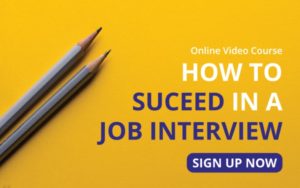Intro
Hello! It’s Kristine here with the Express to Impress podcast. Today, I’ll be talking about how to answer the most common interview question, “Can you tell me about yourself?”
What Makes a Successful Interview?
To answer this question well (and any other question well for that matter!) it’s important to keep the goals of your interview in mind. To get a job offer, you need to accomplish three goals.
- First, you need to communicate the value you offer. What do you bring to the table that other candidates don’t? What makes you capable of performing the job? What can you do for the company to make things better? The content of your answers, combined with your poise, delivery style, and communication skills, inform the interviewer of the value you offer.
- Second, you have to make the interviewer believe that you are a good fit. Your interviewer has to believe you would fit well into the culture and that you share the company’s values.
- Third, your interviewer has to like you. Your interviewer has to feel good around you. They have to feel so comfortable around you that they would be able to see your face nearly every day! They have to believe that they would get along with you, enjoy your company, and be productive alongside you.
So, now that you know your goals for an interview, let’s take a closer look at the question, “Can you tell me about yourself?”
The Purpose of the Question, “Can You Tell Me About Yourself?”
Your interviewer wants to get to know you and give you an easy question at the start of an interview. Interviews can be stressful, and they want to put you at ease. Employers and recruiters interview a lot of people, and it’s hard to keep them straight. It may have been days or even weeks since they looked at your resume, and they need a refresher!
Why “Tell Me About Yourself” is so Important
Guessing what questions your interviewer will ask you can be difficult, but you can always count on this question. That means that you can be well-prepared for at least one question! When you deliver a great answer at the start of your interview, it will give you confidence and impress your interviewer right off the bat.
Story
As a Certified Employment Interview Professional, I get to help people during one of the most exciting and stressful times in their careers. One of the first things I tell my clients when we meet for mock interview practice is, “Congratulations on your job interview! The employer is already really impressed if they want to meet you! Employers only invite a small percentage of applicants to interview for a job. So, the odds are in your favor!” It can be useful to hear how other people answer the question, tell me about yourself. So, I’m providing you with answers I’ve heard from students and clients. (I’ve altered identifying details for privacy reasons.)
“Tell Me About Yourself” Example Answers
The first answer is from a software developer who needed to address a potential red flag–working for an employer for less than a year. He had landed his first job in the U.S. just a few months ago. He thought he would be working for his dream employer and was quickly disappointed, so he was looking to switch jobs. My client decided not to spend much time talking about his previous positions as they were in Russia, and he thought the employer would be most interested in his U.S. work experience. While he was disappointed with his current job in many ways, he did not want to talk negatively about the employer. So, he focused on one reasonable issue that simultaneously showed his ambitions and work culture preference. Here’s what he said:
I recently started working at Amazon. Amazon is such a great company. The employees are professional, and I’ve had the chance to contribute to building the framework for some really promising products. I’m using Node.js and other internal technologies. I get to do software development for the company. But unfortunately, I’m on a team where people speak Russian all day. I’ve worked hard to develop my English language skills, and I want to work somewhere that I can do software development in English. This was my first time working for a huge company, and I worked for a startup in the past. I discovered I definitely prefer working for a startup. I like the work and the culture in startups better. So, now I want to get a web developer job for a startup where I can work hard on interesting development projects.
This next client was interviewing for her first job to be a Certified Registered Nurse Anesthetist. She wanted to convince the interviewer of her passion for client care and show her intellectual drive. Other goals were to show her motivation and readiness for working as a CRNA.
First of all, thank you for inviting me to the interview. I am very excited to have an opportunity to introduce myself. I graduated with a nursing degree from the University of Missouri Magna Cum Laude. Then, I worked as an ICU nurse in a transplant hospital for three and a half years. I also worked as a nurse at a burn ICU at a level one trauma military hospital. I’m attracted to critical care because it challenges me intellectually, and I like helping people in crisis. Apart from my regular ICU duties, I have participated in a research study to find ways to reduce the 30-day readmission of post-liver transplants. After a year of being a nurse, I became interested in pursuing a career as a CRNA. I love that CRNAs can administer anesthesia and are able to manage patient care independently and respond to difficult situations. Additionally, one of my goals is to volunteer, and I like how CRNAs are highly needed professionals nationally and internationally and can help people in need. So, I began looking for a school known for its academic and clinical programs and settled on Georgetown University’s nurse anesthesia program. I got accepted, and the program confirmed that anesthesia is the specialty for me. I recently graduated and just passed the National Certification Examination for Nurse Anesthetists. Now, I’m here today, interviewing for my first job as a CRNA! I believe the ICU unit of your hospital would be the perfect place for me to serve patients. You have a strong reputation for providing exceptional patient care, which is something I care deeply about.
Alright, this next client recently completed grad school and had robust international work experience that she wanted to highlight. She was applying for data analyst and business analyst positions.
My name is Sarah Meng. I am originally from Taiwan, and I’ll tell you a little about my path to becoming a data scientist. A great data scientist needs a strong foundation in business and excellent technical skills. So I started off earning a Bachelor’s Degree in Business Economics at UCSF. After that, I put my business knowledge into action while working at a leading integrated logistics company. I had a lot of responsibility as a senior associate in the CEO’s office and was involved in business operations and management decisions. After three years in that role, I shifted my focus to developing my technical skills. I recently earned a master’s degree in business analytics from UCLA and continue to work on my technical skills, like learning new languages and software so that I can clean and manipulate data and perform data visualization. I feel confident I have developed both areas sufficiently to excel in a data analyst or business analyst position.
While there are differences among the candidate’s answers, each tells a story. The candidates explain why they want the job and how it’s a natural progression in their career. For each of these clients, English was their second language. Preparing for their interviews helped to build their confidence, and each of them succeeded in their interviews.
Tips
In the tips section, I will share guidance on the content and length of your answer to the question, tell me about yourself. In other episodes, I will talk about the delivery of interview responses, which is incredibly important. A great answer to this question can give you the chance to show off your communication skills, and it can give non-native English speakers a chance to prove their English skills are up to par. Keep in mind that these are guidelines, and time is limited, so great answers don’t necessarily follow all of these tips.
- Length: Most of your answers should be around 60 to 90 seconds. But, you can talk more when answering this question. Feel free to speak up to two or three minutes. This amount of time will allow you to tell the interviewer what they want to know, help you avoid sharing irrelevant details, and show respect for your interviewer’s time. Ideally, you will hook the interviewer with your answer. You’ll give them just enough information so that they want to ask more. So, welcome follow-up questions. It means you gave an intriguing response. You want the interview to be a conversation, not an interrogation.
- Briefly share experiences, qualifications, and values that are most relevant. You should show that you are qualified or better yet, overqualified! For example, if the job doesn’t require Spanish, but you speak it, and it could improve your contribution, bring it up! You’ll certainly grab their attention. Also, it’s okay to mention something you wrote in your cover letter.
- Prepare your answer by writing bullet points. If you prepare a script, you risk memorizing it and sounding robotic. Your answers should sound natural. If English is your second language and you’ve written a script, the interviewer may doubt your English skills if it’s obvious you are reciting a memorized response.
- Tell a story. Your resume contains important information about your qualifications and experiences, but it doesn’t explain why these things happened in your life and what you learned along the way. In an interview, you get to fill in the missing pieces. Why did you pursue your field? What did you learn at your last job? What are your interests? Why do you want to leave your job for the job at hand? These are the often unspoken questions that you should be addressing in your story.
- If you’d like a format to follow, try this. Explain your present employment situation. E.g., “I’m currently a [title] at [company name] where I [share what you do, starting with strong action verb].” Then, shift to the past, giving a brief overview of your career highlights, achievements, and professional interests and motivations. Briefly explain when you discovered interests, why you chose the field, why you left jobs, or what you’ve learned. Finally, end briefly by focusing on the future. You could say why you’re pursuing a new job at this time.
- Use the opportunity to address any potential red flags in your resume.
- Use transition words to show cause or purpose. Since, because, and so are common transition words for this answer.
Alright, with these tips, you’re all set to answer the interview question, “Can you tell me about yourself?”!
How to Succeed in a Job Interview Online Course
Learn what to say and do before, during, and after your interview in my online course, “How to Succeed in a Job Interview.” In this course, you’ll learn how to speak clearly and confidently about yourself, your accomplishments, and your career goals. My signature 5-hour course that covers everything you need to know to get a job. However, this course is focused on job interviews. It is just 90-minutes and a third of the price of my signature course. Plus, you can get 15% off when you use the coupon code podcast15 at the checkout. Learn more and sign up today at express-to-impress.com. In the next part of this episode, I’ll cover the idioms and phrases I used for people looking to build their English vocabulary.
Idioms & Phrases
Keep Them Straight
Employers and recruiters interview a lot of people, and it’s hard to keep them straight.
It means to avoid confusing or messing up something or to keep something organized.
Right off the Bat
When you deliver a great answer at the start of your interview, it’s going to give you confidence and impress your interviewer right off the bat.
It means when something happens at the beginning or immediately.
The Odds are in Somone’s Favor
The odds are in your favor!
This means when someone is likely to win or succeed.
Up to Par
It can give non-native English speakers a chance to prove their English skills are up to par.
It means that something is as good as expected or wanted.
Grab Attention
You’ll certainly grab their attention.
It means to attract one’s attention.
Alright, that’s all for today. Thank you so much for listening to this episode of Express to Impress. If you found it helpful, please share it with a friend. I hope to see you next time. Bye!







Leave a Reply
Your email is safe with me.